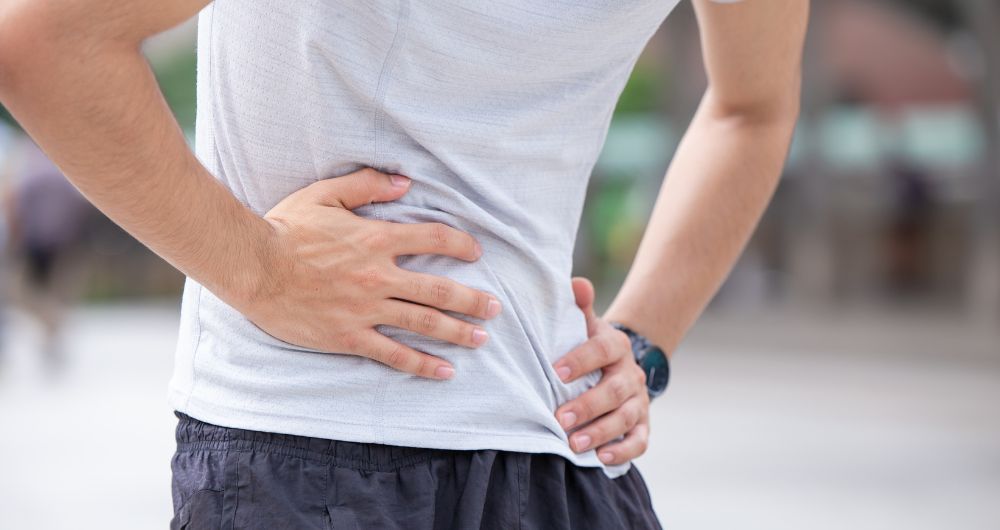
Key Takeaways
Introduction
6 Signs You Need Urgent Care in Fairfield, CT, for Lower Abdominal Pain
12 Common Causes of Lower Abdominal Pain in Men
Natural Ways to Ease Lower Abdominal Pain in Men
Complications of Ignoring Lower Abdominal Pain
Frequently Asked Questions
Key Takeaways
✔ If you experience any signs of lower abdominal pain, promptly seek urgent care in Fairfield, CT.
✔ Understanding common causes of lower abdominal pain in men can help you identify potential reasons for your discomfort.
✔ Incorporating some natural remedies into your routine can relieve lower abdominal pain. However, if symptoms persist or worsen, seeking medical advice from urgent care in Fairfield, CT, is essential.
✔ Ignoring lower abdominal pain can lead to severe complications and impact your overall health. |
Recognizing abdominal pain in men is crucial for identifying potential underlying conditions that may require urgent medical attention. Knowing when to seek urgent care in Fairfield, CT, can make a significant difference in managing and treating abdominal pain effectively.
Here are some indicators to look out for:

Lower abdominal pain can be a symptom of various health issues, some of which require immediate medical attention. Recognizing when this pain necessitates a visit to an urgent care facility is crucial for timely diagnosis and treatment. Here are six signs that indicate the need for urgent care in Fairfield, CT, for lower abdominal pain:
If you suddenly experience intense lower abdominal pain that seems to come out of nowhere, it could signal a medical emergency. This type of pain may be sharp, stabbing, or cramping and could indicate conditions such as appendicitis, kidney stones, or testicular torsion. Seeking urgent care in Fairfield, CT, is essential to determine the cause and receive prompt treatment.
The combination of nausea, vomiting, and lower abdominal pain can indicate a range of conditions, including gastroenteritis, urinary tract infections, or appendicitis. Urgent care in Fairfield, CT, can provide diagnostic testing and supportive care to alleviate symptoms and prevent complications.
Lower abdominal pain with diarrhea or bloody stools indicates gastrointestinal issues, such as inflammatory bowel disease, infectious colitis, or gastrointestinal bleeding. These symptoms can lead to dehydration and electrolyte imbalances, requiring urgent medical attention to prevent complications.
Pain or difficulty urinating along with lower abdominal pain may signal a urinary tract infection, kidney stones, or prostate problems. These conditions can worsen if left untreated, leading to complications such as kidney damage or urinary tract obstruction. Urgent Care in Fairfield, CT, can perform diagnostic tests and prescribe appropriate medications to alleviate your symptoms.
Swelling or tenderness in the lower abdomen could indicate hernias, ovarian cysts, or abdominal wall infections. Urgent care in Fairfield, CT, can evaluate your symptoms and recommend appropriate treatment options based on your diagnosis.
If you experience additional symptoms such as dizziness, lightheadedness, or fainting along with lower abdominal pain, it could indicate a more serious underlying condition such as internal bleeding or sepsis.

Lower abdominal pain in men can arise from various underlying conditions, ranging from benign to potentially life-threatening. Below are 12 prevalent reasons men may experience discomfort in the lower abdominal region.
Prostatitis, or inflammation of the prostate gland, can lead to lower abdominal pain in men. This condition may cause discomfort in the lower abdomen and upper thighs. Urgent care in Fairfield, CT, is necessary to determine the cause of prostatitis and initiate appropriate treatment, which may include antibiotics and pain management.
UTIs can cause lower abdominal pain in men, especially if the infection spreads to the bladder or kidneys. Symptoms may include pain or burning during urination, frequent urination, and lower abdominal discomfort. Treatment typically involves antibiotics prescribed by an urgent care in Fairfield, CT, after diagnosis through urine testing.
Testicular torsion occurs when the spermatic cord twists, cutting off blood flow to the testicle. This condition is a medical emergency and requires urgent care in Fairfield, CT, to prevent testicular damage. Symptoms include sudden and severe lower abdominal pain, swelling of the scrotum, and nausea. Surgery is often necessary to correct testicular torsion.
Constipation, characterized by infrequent bowel movements and difficulty passing stool, can cause lower abdominal pain in men. Dietary changes, increased water intake, and over-the-counter laxatives may help alleviate symptoms. However, persistent or severe constipation should be evaluated by an urgent care in Fairfield, CT, to rule out underlying conditions.
A kidney infection known as pyelonephritis can cause severe lower abdominal pain, particularly around the flanks, and may radiate to the back and umbilical area. Urgent care in Fairfield, CT, with antibiotics, is necessary to prevent complications such as kidney damage. Diagnosis is typically made through urine analysis and imaging studies.
Muscle strain, often resulting from overexertion or sudden movements, can cause localized lower abdominal pain in men. This discomfort may worsen with movement and typically resolves with rest and conservative measures. Treatment in urgent care in Fairfield, CT, may include applying ice packs to the affected area, taking over-the-counter pain relievers, and gently stretching the muscles.
Diverticulitis occurs when small pouches in the colon become inflamed or infected. Symptoms may include severe lower abdominal pain, fever, nausea, and changes in bowel habits. Treatment urgent care in Fairfield, CT, typically involves antibiotics, dietary modifications, and, in severe cases, hospitalization for intravenous antibiotics and bowel rest.
IBS is a chronic digestive disorder characterized by abdominal pain, bloating, and changes in bowel habits. While the exact cause of IBS is unknown, symptoms can be managed through dietary changes, stress reduction techniques, and medication prescribed by the urgent care in Fairfield, CT.
Appendicitis is inflammation of the appendix and commonly presents with lower abdominal pain that starts around the belly button and migrates to the right lower abdomen. This condition can quickly escalate to a medical emergency requiring surgical removal of the appendix to prevent rupture and infection. Symptoms may also include nausea, vomiting, fever, and loss of appetite. Immediate medical attention at an urgent care in Fairfield, C, is necessary for diagnosis and treatment.
An inguinal hernia occurs when tissue, such as a portion of the intestine, protrudes through a weak spot in the abdominal wall in the groin area. This can lead to lower abdominal discomfort, especially during activities like lifting or straining. Treatment typically involves surgical repair to prevent complications such as bowel obstruction or strangulation.
Stomach ulcers, also known as peptic ulcers, are sores that develop on the stomach lining or the small intestine’s upper part. These ulcers can cause burning or gnawing pain in the lower abdomen, especially between meals or at night. Urgent care in Fairfield, CT, may include medications to reduce stomach acid production and promote healing, as well as lifestyle modifications such as avoiding NSAIDs and alcohol. If left untreated, stomach ulcers can lead to complications such as bleeding or perforation.
Indigestion, or dyspepsia, can cause discomfort in the lower abdomen, often accompanied by symptoms such as bloating, belching, and nausea. This condition may be triggered by overeating, eating spicy or fatty foods, or consuming alcohol or caffeine. Lifestyle modifications such as eating smaller meals and avoiding trigger foods can help manage symptoms.
These natural methods aim to relieve discomfort without relying on invasive treatments, allowing individuals to manage their symptoms effectively and promote overall well-being. Still, professional intervention at an urgent care in Fairfield, CT, is crucial to maximize these methods.
Applying heat to the lower abdomen, such as a warm towel or heating pad, can help relax muscles and alleviate tension. This reduces discomfort associated with conditions like muscle strain or menstrual cramps.
Drinking adequate water is crucial for maintaining hydration and promoting overall digestive health. Staying hydrated can help prevent constipation, which can contribute to lower abdominal discomfort. Aim to drink at least eight glasses of water daily and adjust based on activity level and climate.
Stress and tension can exacerbate lower abdominal pain. Relaxation techniques such as deep breathing, meditation, or yoga can help reduce stress and promote relaxation, which eases discomfort associated with irritable bowel syndrome (IBS) or tension-related pain.
Consuming a diet high in fiber can help regulate bowel movements and prevent constipation, which can cause lower abdominal pain. Fiber-rich foods such as fruits, vegetables, whole grains, and legumes can promote digestive health and alleviate discomfort.
If you experience indigestion or heartburn causing lower abdominal discomfort, over-the-counter antacids can help neutralize stomach acid and alleviate symptoms. Antacids are available in various forms, including tablets, liquids, and chewable tablets, and can provide quick relief for mild indigestion.
Probiotics are beneficial bacteria that promote digestive health and may help alleviate symptoms of conditions like IBS or gastrointestinal infections. To support gut health and reduce lower abdominal pain, consider taking a daily probiotic supplement or consuming probiotic-rich foods such as yogurt, kefir, or fermented vegetables.
If abdominal pain persists or worsens, seeking evaluation and guidance from urgent care in Fairfield, CT, ensures proper diagnosis and personalized treatment.

Ignoring lower abdominal pain in men can lead to serious health complications if left untreated. Understanding the potential risks and knowing when to seek medical attention at an urgent care facility in Fairfield, CT is important.
Ignoring lower abdominal pain in men can lead to the progression of underlying conditions, such as prostatitis or appendicitis, which may require urgent care in Fairfield, CT. Without timely intervention, these conditions can worsen and result in severe complications.
Neglecting lower abdominal pain may increase the risk of serious infections, such as urinary tract infections or kidney infections, necessitating immediate attention from an urgent care facility in Fairfield, CT. Untreated infections can spread and cause systemic complications.
Failure to address lower abdominal pain promptly can result in potential organ damage, particularly in cases of conditions like kidney stones or diverticulitis. Seeking urgent care in Fairfield, CT, can help prevent irreversible harm to vital organs.
Chronic pain may develop if lower abdominal pain is ignored, leading to a persistent and debilitating condition that requires ongoing management. Without timely intervention and proper treatment at urgent care in Fairfield, CT, individuals may find themselves dealing with prolonged suffering and the need for ongoing pain management strategies.
Ignoring lower abdominal pain may increase the likelihood of requiring surgical intervention, especially if the underlying condition progresses to a critical stage. Seeking urgent care in Fairfield, CT, can help identify conditions early and potentially avoid surgery.
Ignoring lower abdominal pain may result in life-threatening emergencies, such as a ruptured appendix or sepsis. Prompt evaluation and treatment at an urgent care in Fairfield, CT, can help prevent potentially fatal complications and save lives.

While sperm itself typically does not cause abdominal pain, certain conditions related to reproductive organs or urinary tract infections may lead to discomfort in the lower abdomen after ejaculation. If you experience persistent or severe abdominal pain after ejaculation, it’s advisable to seek medical evaluation to determine the underlying cause.
Gas-related stomach pain often presents as bloating, cramping, or sharp, stabbing sensations in the abdomen. This discomfort may worsen after eating or when lying down and can be accompanied by belching or flatulence. Keeping a food diary to identify trigger foods and practicing relaxation techniques may help alleviate gas-related stomach pain.
Stomach pain specifically refers to discomfort originating from the stomach, while abdominal pain encompasses discomfort originating from any area of the abdomen, including the stomach, intestines, liver, or kidneys. Stomach pain may feel like burning or gnawing sensations, while abdominal pain can vary in intensity, location, and quality depending on the underlying cause.
Certain types of stomach pain should prompt immediate medical attention, including severe or sudden abdominal pain, especially if accompanied by fever, vomiting, or difficulty breathing. Additionally, abdominal pain that persists or worsens over time or is associated with symptoms such as bloody stools, difficulty swallowing, or chest pain, should not be ignored and requires prompt evaluation by a healthcare professional.
While occasional abdominal discomfort is common and often benign, persistent or severe abdominal pain in men should not be considered normal and may indicate an underlying medical issue. Various conditions, including gastrointestinal disorders, urinary tract infections, and reproductive organ problems, can cause abdominal pain in men.
Experience relief from lower abdominal pain at DOCS Urgent Care & Primary Care Fairfield. Our experienced medical team is dedicated to providing prompt and compassionate care to address your discomfort. Whether you’re experiencing mild discomfort or severe pain, we offer comprehensive evaluations and personalized treatment plans to help you feel better quickly. Don’t let abdominal pain disrupt your daily life – visit DOCS Urgent Care & Primary Care Fairfield today to find the relief you need!



During this surge in COVID-19 cases, our primary focus is meeting the high demand for tests, and we are seeing higher than usual wait times. This means we are unable to answer most phone calls. Please know that our teams are working very hard during this time to care for as many patients as safely as possible. Please click the button below for answers to common questions. We appreciate your understanding.